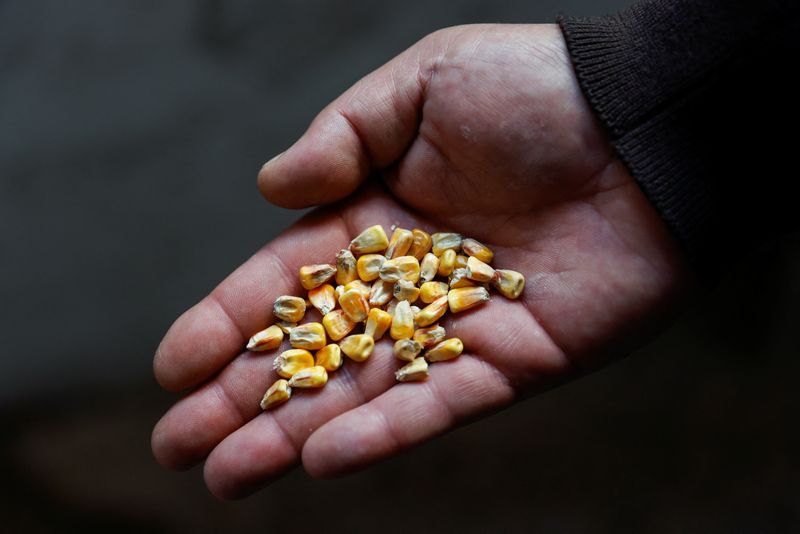By Pavel Polityuk and Silvia Aloisi
KYIV (Reuters) -Ukraine is seeking ways to get grain and vegetable oils out of the country by breaking a months-long blockade of the Sea of Azov and the Black Sea by the Russian navy and moving more by land.
The war, together with Western sanctions against Russia, have sent the price of grain, cooking oil, fertiliser and energy soaring.
That in turn is threatening a global food crisis as many countries count on Russia and Ukraine for more than half of their wheat imports, including some of the poorest.
Russia and Ukraine together account for nearly a third of the global wheat supply, and their importance has been underscored by an Indian export ban and adverse crop weather in North America and Western Europe.
Ukraine is also a major exporter of corn, barley, sunflower oil and rapeseed oil, while Russia and Belarus - which has backed Moscow in the war and is also under sanctions - account for over 40% of global exports of the crop nutrient potash.
HOW MUCH GRAIN IS STUCK IN UKRAINE?
Grain is one of Ukraine's main industries, with exports totalling $12.2 billion in 2021 and accounting for nearly a fifth of the country's exports.
Prior to the war, Ukraine exported 98% of its cereals and oilseed via the Black Sea, at a rate of up to 6 million tonnes per month. Typically, only a fraction of its exports went by rail, where transport costs are higher.
But with the ports blocked and the railway system unable to cope with the extra volume, the country is currently only exporting between 1-1.5 million tonnes a month.
U.S. Secretary of State Antony Blinken last week accused Russia of using food as a weapon in Ukraine by holding "hostage" supplies for not just Ukrainians, but also millions around the world. The Kremlin says it is the West that triggered the crisis by slapping sanctions against Moscow.
According to a U.N. food agency official, nearly 25 million tonnes of grain were stuck in Ukraine as of early May due to infrastructure challenges and the naval blockade. As prices surge, U.N. agencies are having to cut food rations for refugees and displaced people by up to half in parts of the Sahel, for example, due to a massive funding shortfall.
WHY CAN'T THE GRAINS GET OUT OF UKRAINE BY LAND?
Exporting by train is a challenge because the Ukrainian rail system operates on a different gauge to European neighbours such as Poland, so the grain has to be transferred to different trains at the border where there are not many transfer or storage facilities.
Kyiv has also been stepping up efforts to ship via the Romanian Black Sea port of Constanta. But as of mid-May, only about 240,000 tonnes of grain - or 1% of the volume stuck in Ukraine - had passed through, its manager Florin Goidea told Reuters.
Re-routing grain to Romania involves transport by rail to ports on the Danube river and loading cargoes onto barges for sailing towards Constanta - making the process complex and costly.
WHAT OTHER OPTIONS ARE BEING DISCUSSED?
Western powers have been discussing the idea of setting up "safe corridors" to allow grain to be shipped out of Ukrainian ports.
But officials have warned that any such corridor would not be possible without Russian consent.
Ukraine says it needs "guarantees of security", with deputy economy minister Taras Kachka telling Reuters last week that having "vessels of third countries in the area …would be an ideal situation."
Russia's foreign ministry in turn said that if it were to heed a United Nations appeal to open access to Ukraine's Black Sea ports, the removal of sanctions against Russia would also have to be considered, the Interfax news agency reported.
Making things even more difficult are drifting mines in the Black Sea, which each side accuses the other of planting.
Insurance costs for any vessel braving these shipping lanes would also likely be very high.
The situation has taken on added urgency because of a shortage of grain storage space in Ukraine, where the next crop will be harvested from July.
Up to 35% of Ukraine's total storage capacity of 61 million tonnes could still be used up by the old 2021 crop by the time the new harvest comes in, according to research centre APK-Inform.
